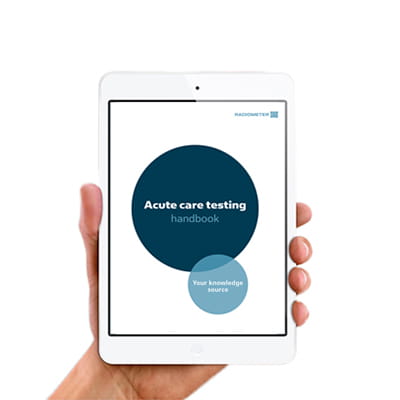Printed from acutecaretesting.org
Journal Scan
May 2019
A tool for evaluating point-of-care tests
Summarized from Huddy J, Ni M, Misra S et al. Development of the Point of Care Key Evidence Tool (POCKET): a checklist for multi-dimensional evidence generation in point of care tests. 2018 Clin Chem Lab Med. Published online ahead of print 9th Nov 2018. Available at: https://doi.org/10.1515/cclm-2018-1089
One of the most significant developments in laboratory medicine over the past few decades has been application of point-of-care testing (POCT). Technological advance allows an ever-increasing repertoire of in vitro diagnostic and monitoring tests to be performed outside the laboratory, at the patient’s bedside, in the clinic, GP surgery and pharmacy, by non-laboratory clinical staff. Some POCT technologies allow patients themselves to monitor aspects of their health that were once the sole preserve of the clinical laboratory. As the authors of this study observe, “the POCT industry is expanding rapidly, with an estimated 29 % share of the in vitro diagnostic market, worth US $24 billion.”
Healthcare innovation can be a long and tortuous process for a number of reasons, not least the length of time required to generate the evidence base required to justify the innovation. The complexity of POCT innovation is well conveyed by this recently published UK study. The aim of this study was to develop a ”one stop” comprehensive checklist tool that can be used to fully evaluate novel POCTs and thereby facilitate (reduce) the lead time from feasibility to adoption in healthcare pathway(s).
The resulting checklist called Point of Care Key Evidence Tool (POCKET) comprises 64 statements for consideration, divided under the following seven themes:
• technical description of the test
• clinical pathway
• patient stakeholders
• economic evidence
• test performance
• usability and training.
The POCKET checklist was developed by researchers engaging in a Delphi process of structured interviews and questionnaires with 43 representatives of five stakeholder groups: clinicians; laboratorians; research methodologists; in vitro diagnostics industry representatives; and NHS regulators and clinical commissioners. At the close of this Delphi process, experts from each of the stakeholder groups met in workshops to finalize the checklist suggested by the analyzed results of the Delphi process.
The final consensus POCKET checklist is available on the website of the National Institute for Health Research (NIHR) that sponsored this study. It can be viewed at: http://london.ivd.nihr.ac.uk/industry-innovators/#tools-and-information
Healthcare innovation can be a long and tortuous process for a number of reasons, not least the length of time required to generate the evidence base required to justify the innovation. The complexity of POCT innovation is well conveyed by this recently published UK study. The aim of this study was to develop a ”one stop” comprehensive checklist tool that can be used to fully evaluate novel POCTs and thereby facilitate (reduce) the lead time from feasibility to adoption in healthcare pathway(s).
The resulting checklist called Point of Care Key Evidence Tool (POCKET) comprises 64 statements for consideration, divided under the following seven themes:
• technical description of the test
• clinical pathway
• patient stakeholders
• economic evidence
• test performance
• usability and training.
The POCKET checklist was developed by researchers engaging in a Delphi process of structured interviews and questionnaires with 43 representatives of five stakeholder groups: clinicians; laboratorians; research methodologists; in vitro diagnostics industry representatives; and NHS regulators and clinical commissioners. At the close of this Delphi process, experts from each of the stakeholder groups met in workshops to finalize the checklist suggested by the analyzed results of the Delphi process.
The final consensus POCKET checklist is available on the website of the National Institute for Health Research (NIHR) that sponsored this study. It can be viewed at: http://london.ivd.nihr.ac.uk/industry-innovators/#tools-and-information
Disclaimer
May contain information that is not supported by performance and intended use claims of Radiometer's products. See also Legal info.
Acute care testing handbook
Get the acute care testing handbook
Your practical guide to critical parameters in acute care testing.
Download now






